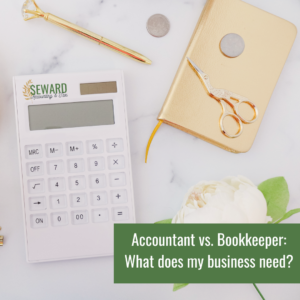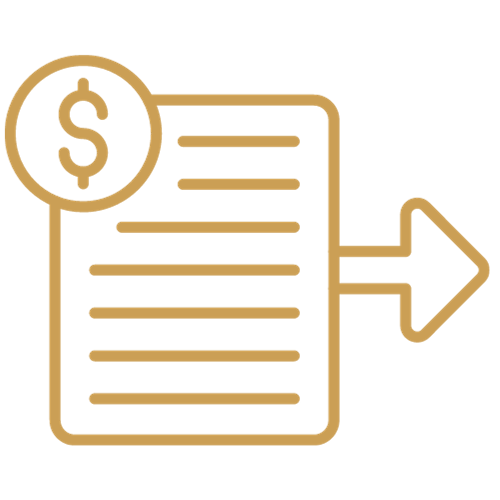Small business owners usually start out managing all areas of their business on their own, even the ones they don’t enjoy. As business grows, a common area owners often seek help in is their company finances.
Employing the services of a financial professional for your company is very helpful and important; however, it is often hard to know whether you need a bookkeeper or an accountant.

Bookkeeper vs. Accountant: What’s the difference?
The terms “bookkeeper” and “accountant” are often used interchangeably, and their roles do overlap, but there are some distinct differences between the two jobs.
While both types of financial professionals help your business, accountants focus on the big picture, while bookkeepers focus on the day to day business operations.
Bookkeeping
Bookkeepers have an administrative, detail-oriented role, and the emphasis is on compiling accurate financial information. In simple terms, bookkeeper’s keep a record of all financial transactions, logging daily transactions in a logical, accurate, and easily accessible way.
Typical bookkeeping tasks include:
- Recording financial transactions
- Posting debits and credits
- Producing invoices
- Reconciling bank accounts
- Managing bank feeds
- Managing payroll
- Maintaining and balancing general ledgers
Accounting
Accountants use the same information as bookkeepers, but their main focus is to interpret and analyze the financial data that bookkeepers would just collect. Accountants consider the business’ big picture, provide financial advice and tax guidance.
They offer a complete overview of where your finances stand, advice on what to do about potential problems and how to prepare for the future. An accountant uses and analyzes the financial data recorded by the bookkeeper and provides business owners with essential insights and financial advice based on that information.
Typical accountancy tasks:
- Checking and adjusting financial records
- Interpreting data compiled during bookkeeping processes
- Compiling reports, performing audits, and preparing financial reporting records, income statements, and balance sheets
- Presenting information required for forecasts, showing business trends and highlighting opportunities for growth
- Advising the business owner regarding financial decisions and their potential impact on the business
- Tax submissions, tax consulting and reducing owners’ tax liability, representing the business before SARS if the company is audited
Accountants also play a vital role in helping new entrepreneurs write a business plan. When launching a new business venture, they advise on choosing the company’s legal structure and the tax implications thereof.
At Seward Accounting & Tax, we have a variety of services, including both bookkeeping and accounting, personalized to meet your needs.
When to hire a financial professional.
The duties of bookkeepers and accountants differ, and the right choice depends on your unique needs, your business’s current financial position, and your plans to grow.
Getting expert guidance and support from a professional accountant or bookkeeper can help to protect and grow your business. When you find yourself spending more time on accounting tasks than on the business, it’s time to get help.
Hiring a professional can help lighten your workload and increase your capacity to deal with other areas of the business.
How can we help?
Contact us by filling out our free estimate form to find out how we can partner with you to take your business to the next level.





